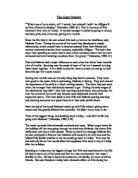The Great Gatsby
This romantic and traumatic story of Gatsby’s never ending love trail encompasses only one true meaning. The struggle to catch Daisy’s love and reach underlying indifference between Gatsby’s Phantom dream of wealth and her high-class expectations. Fitzgerald reveals Gatsby’s underlying purpose of not only gaining Daisy’s love but also flexing the power of wealth and importance. This power is exposed through Fitzgerald’s use of illustrative diction, social and emotional contrast, and effective and powerful syntactic organization. By taking all these things in to his writing, Fitzgerald demonstrates how Gatsby quest for wealth breaches the point of obsession.
Fitzgerald’s goal was to show his own desire for the upper class and through the passion, which Gatsby showed for Daisy. The reader knows and feels this desire that courses through Gatsby’s mind throughout the novel and especially this passage. By weaving these powerful emotions through the passage, a symbolistic importance immerges from Fitzgerald diction that exposes the sorrow and need in Gatsby’s voice. This diction that Fitzgerald uses perfectly illustrates how Gatsby sees his superior Daisy. This complex context of language that assembles itself on the page to analyze the physical being of Daisy presents itself with built in layers of meaning. The first level as seen in his obsession with Daisy’s presence is slowly peeled away when the underlying and most significant plane of the novels framework is seen through the textured layers. Fitzgerald reveals that Gatsby’s real love is not for Daisy but for the life she lives. With the statement about “Her porch was bright with the bought luxury of star shine”, it gives the reader a mental image of how rich Daisy really was. Gatsby developed a passion when he first laid his eyes on a real symbol of upper-class society. This shifted quest for wealth and equality is tenfold stronger then the love of a spoiled rich girl. This is essentially why Gatsby has to wear a masked identity. The mask of passion with the face of a sunken moneyless figure. In addition, in contrasting how poor Gatsby was through the emotional detail it showed the desperation that Gatsby felt as he slowly climbed the social latter just to find within himself that there absolutely no solution. This whole passage screams need and want. He knew that he would be risking failure in his illogical dream if she knew about his real life. This was a weighing factor on his mind and Fitzgerald shows this through Gatsby’s constant comparison between his life and the extensive feat of moving social classes to resolve the new disparity in his life. Gatsby knew he didn’t have money like Daisy. His comparison of his living quarters and her mansion in “It gave a breathless intensity was that Daisy lived there – it was as casual a thing to her as his tent out at camp was to him” shows that exactly. This indifference and separation is the only factor that set them apart. His quests for wealth in order to be like daisy has sent him on this addiction to out show and fantasize about what his life could be. His deceiving perspective shows only happiness through the power of love but this transparent one is easily outweighed with the greed and power hungry corruption of the upper class.







